The importance of vocabulary learning can never be overstated, and by vocabulary, we do not refer to a single lexical unit. We also mean lexical terms and this could represent phrases that we very commonly used in our day-to-day communication phrases, like good morning or nice to
meet you. This even though they are learnt as a lexical unit and as individual word, they are actually categorized as a lexical chunks, and these are also an important part of vocabulary development. By lexical of course, we mean word for the vocabulary of a language.
For developing vocabulary is not something that is done in an artificial way, you have to realize it is a natural process but done consciously when you start learning a language.
WHAT ARE THESE WORDS & PHRASES?
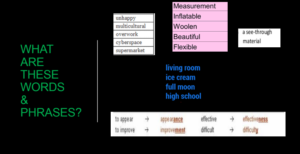
- Look at the words on the screen; you will see that you come across quite commonly in your day- to-day communication.
- For example, unhappy or supermarket, I’m sure that the most used these words almost every day if not the cyberspace or multicultural.
- Unhappy and supermarket surely form a part of our day-to-day communication.
- Likewise, measurement or beautiful or flexible these are words again that are commonly used.
- Look at the other set living room, ice cream, full movie, high school and see-through as a see- through material these are not words that are specialist in nature or something that you know, you only when you are giving a kind of an academic lecture.
- These words that are commonly used by all of us and if you notice that is something unusual something different about these words
- Likewise, the ones at the bottom to up here you can see that it is used as the different formats appearance and likewise to improve we use it commonly as improvement.
- So you can see that there is a change in the form of the word as well.
DEVELOPING VOCABULARY THROUGH WORD FORMATION
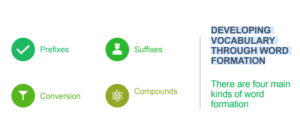
- This concept or this method of developing vocabulary is called word-formation.
- So there are four main kinds of word formation
- unhappy it is an example of a prefix.
- So, you can see that all those words in that list, unhappy, multicultural, overwork, cyberspace and supermarket are actually two words with the exclusion of unhappy everything and multi.
- Everything else is almost an individual word in its own right.
- it helps to understand a little more in- depth on how these words can be used to develop vocabulary.
- So, those are prefixes the second kind of word that we could incorporate into our development of vocabulary is called the suffix.
- words like measurement, inflatable, woollen, beautiful and flexible.
- You see that this word end with a particular either or complete word is very unlikely is a complete word with a set of letters put together to complete or add more meaning to the root word.
- So, you can see measure has become measurement, inflatable is both, you might be confused and probably in is the prefix, but it is not.
- Inflate is the root word and you add, able to it becomes inflatable and likewise woollen, beautiful and flexible.
- You can see that the root word comes the beginning and you add a little word to make it as a suffix, a suffix is added to this word, and it becomes a completely new word with the added meaning of connotation.
- conversion is a little more complex in that you are looking at a change in the grammatical form of the word.
- it is not required to understand how this change happens, this knowledge will help you when you are developing your vocabulary.
- So, use a little bit grammatical term so you can say see through that as standalone words are actually verbs.
- We could see through the gap between the two buildings.
- So you can see that see and through are used as a phrasal verb.
- Whereas when it is used in this context, see-through material it becomes a word that describes materials, so it automatically becomes an adjective.
- So, you can see the verb see-through has become an adjective.
- So that is what you mean by conversion.
- So there is a change in the grammatical form and the grammatical concept of that word.
- So likewise, to appear is a verb, and it becomes appearance, verb becomes noun, to improve becomes improvement and that again, you can see the change from verb to noun.
- Then the fourth and final part is called compounding or where do you use compound words, and this kind of formation is actually, probably the simplest and the most easy to acquire.
- word living room, icecream, full moon and high school, these are probably words that we used in our very, very early formative years of learning the language.
- Of the four types of word formation probably compound words are the easiest onesto acquire followed up by prefixes and suffixes and probably the most complex one to learn at least or to consciously understand the conversion that happens from one grammatical category to another.
Prefixes
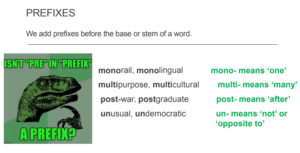
- prefix is a word that is added before the stem or the main of the root word and it comes before the word to add some more meaning to the original word.
- words you can see rail, and there is lingual, so you see the mono is the prefix so its added or fixed before the main word rail and it changes the meaning.
- So, when you say rail, it can be just any kind of reference to probably the Railways, or you know something generic connected to the word rail.
- when you say Monorail automatically, you know that you are referring to one.
- Likewise, monolingual, you talk about somebody who knows only one language as monolingual, and somebody who knows more than one language is bilingual.
- And then you have multilingual, and then you have people who are polyglots.
- you can keep adding prefixes wherein the meaning of the main word changes depending on what is meaning of the prefixes.
- multipurpose and multicultural very commonly used by us in our communication and again multi means many and multifaceted, and there are so many words that you could think of which you could use with this prefix.
- post and postgraduate and post-war, so here post means after, so if you are wondering whether post office also carries the same meaning with because of the addition of post to it, you obviously know that it doesn’t, so you know the reason why post-war and postgraduate is does not have the same meaning as a post office.
- likewise adding un to usual and un to democratic means that it gives the opposite meaning.
- So un here stands for not, so unusual and undemocratic.
- when you add a prefix to a very generic base or stem in certain cases, it gives the opposite meaning.
- But in certain cases, it is all it also adds a different context or a different gives a totally different sense to the whole usage.
- So, prefixes do add a lot of character to be root or stem word.
SUFFIXES
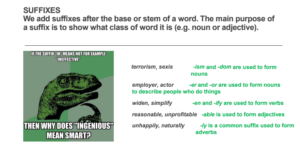
- suffixes are added to the end of the stem or the main word, and it also has the role of a more complex kind compared to the prefix in that it thus indicate what kind of word it is.
- The suffix added to the end of a word will give you some indication of what type of word it is whether it is a noun or an adjective, but none of these things are required in order to learn these words and use them unconsciously
because you don’t have to learn grammatical rules in order to become a good communicator. - if ism is added to terror and sex, and it totally changes the context and the meaning of the word and likewise and these become noun, when you add ism, the word becomes a noun, likewise with employer and actor.
- You can see that er when added to the root it shows some the work, or it describes the things that people do.
- And the same happens with all the other suffixes.
- the main thing about adding suffix is, is that there is also a change in the spelling.
- the addition of those few letters not only changes the grammatical function, but there is also a very, there is a change at the level of spelling as well.
- So this is also something you should be conscious or aware of, especially in writing because of obviously spelling comes into play only when you write.
So prefixes and suffixes words added to the beginning and words added to the end of the root or the main word creates a whole new set of words for you to use in your day to day
communication and it really, and it really adds a fillip to your entire understanding of how to use
words.
Conversion
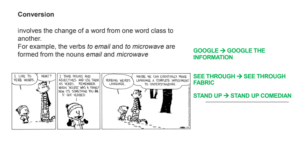
- Conversion, this is a little more you know complex as a concept, but then not really important that affects the way you learn how to use them because usage is different and understanding the grammatical categories of these things is a totally different ballgame and not required for somebody who just wants to be an effective communicator.
- So in conversion, what you see is there is a change of the words from one grammatical functions into another.
- If you look it email and the microwave; if you tell somebody, please email me; obviously it means that email is used as a verb.
- But then if you say that I get about 500 emails a day, their email is used as a noun, you can see that in day to day communication you would not have even realized it, but you can see this conversion happening quite automatically without having an awareness of this.
- Likewise, with microwave and if you look at Google, probably the one action or function, many of us are involved in so unconsciously every other day, in every day of our lives.
- Google is actually the name of a company, and it is a proper noun.
- But then it has become a verb, and we say that oh I Google this information or you know, I found when I Google this, I discovered that there are so many, you know so many hits about this particular topic.
- Google also has many other nouns you can see would have made this conversion into verbs, and like we looked at earlier the see through the example of the see-through fabric.
- Likewise, stand- up comedians, stand-up by itself is a phrasal verb, but then it has converted into a noun, and it become to call somebody who stands up and cracks jokes at a performance, you call them a stand-up comedian.
- Here you can see conversion happening, and there is no reason to be consciously worrying about how do I convert this word into that, is just that awareness helps you improve your understanding.
COMMON CONVERSIONS
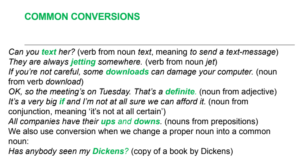
- So here are some more common examples of conversion frequency.
- Look at these words like text.
- Can you text her, text here means what you mostly; what you send people using your mobile device usually an SMS, an SMS or a short messaging service is what you call a text.
- Typically it was used as a noun, but then in this context, it becomes a verb.
- So, likewise, Jet becomes jetting and downloads very commonly used by all of us, and here there is the change
from download the file, if you say, please download the file you are asking somebody to do an action. - Whereas here you can see, this becomes a noun. So this common thing likewise with all the examples and awareness of this conversion will not in any way impede your fluency, but if it will help you be little more conscious about the way you are using the word.
- and it is one of the common ways in which people improve their repertoire of words because if you know, that a particular word that you use so commonly can be used in different ways, and it changes the meaning depending on how you are using it in different context.
- It really enhances your ability as a communicator.
- Compounding like I said earlier is probably the easiest and commonly used strategy to develop one’s vocabulary, and I think we would have acquired as school kids.
- So, when you talk about compounding you are basically bringing together two words and again the grammatical meaning of any of these things are not particular, but just for the better understanding, you can see that words like car park or rock band are very commonly used.
- Especially car park and it comes under the category of nouns.
- Likewise, heartbreaking and sugar- free are adjectives.
- Again two words brought together, sometimes hyphenated, sometimes not again not critical to know for spoken communication and verbal like baby-sit and chain-smoke, adverbs like good-naturedly and nevertheless.
- You can see that two unlikely words come together, and they form one word which is used and enhances the meaning of the message that you are trying to say.
- So these things like compounding and conversion, obviously the native speakers used this quite effortlessly and without much conscious awareness of using it.
Building Vocabulary
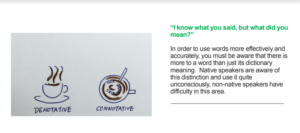
- look at denotative very simply look at that; very high sounding word even though it sounds very high sounding, it is basically if you open a dictionary and you look at the meaning of a particular word, whatever definition it has given you in that page is basically the denotative meaning of a word.
- So the dictionary meaning or the definition that is the meaning of denotative whereas Connotative is basically the shades of meaning or the emotion or the mood that a particular word carries. And as we go along will see how very interesting this difference is.
- if you are a native speaker of the language, you really don’t have to worry about these distinctions because it will automatically, you know occur in your speech.
Denotation and connotation
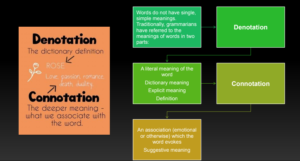
- If you look at rose probably if you look up the dictionary it would say that this is a plant which has thorns and you know, it has most cases it has a flower which is in most cases is pink in colour or some kind of definition which is very simple in most dictionary and what is called the literal meaning of the word, and that is what you would find in the dictionary, which is the explicit meaning or the literal meaning or a definition.
- These are different words in which you can describe denotative meaning.
- Whereas, the connotative meaning is the association or the emotion that is evoked when you talk about or you refer to a particular word that is a suggestiveness that goes with the use of that word.
- So, if you say rose, it evokes a certain mental image in you, or you had a particular experience with a particular event or you know some occurrence in your life.
- Apart from a personal occurrence, you also know that symbolizes certain other emotions.
- So like here it says its love, passion, romance, death or even duality.
- there is a very clear distinction in the literal meaning of a rose which is a plant, which is a flowering plant which also has thorns and there is this connotative or the deeper meaning that is associated with the word which evokes images of love and passion and probably Valentine’s Day.
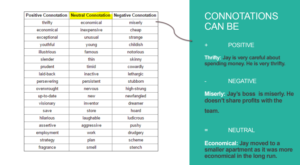
- there are a whole lot of words on the screen and there are three categories under which these are listed.
- So, connotations can be of 3 kinds; positive, negative or as well as neutral.
- depending on where you use the word and to whom you use it and the context that matters.
- the word rose if you are using it in a; when you are talking to your gardener, he obviously knows that you are referring to the plants
- When you have a conversation with a gardener about a rose, you are not really going into the connotative meaning of a word like that.
- But if you are talking about the rose and you are reading about it in a poem by some romantic poets from England, you obviously know he is not just talking about the rose, and you know what its literal meaning is, you know he is talking about emotions that flower has evoked in him at some point in his life.
- So you look at this list, and you look at the word thrifty you can see that thrifty is a synonym with miserly and economical, but you can see that the three words even though they are closely connected as in meaning they are closely connected, you can see that there is a big difference in the connotation that they provide to those who you said.
- example, if you say that Jay is very careful about spending money is very thrifty.
- This person comes across as somebody who is very careful about spending money; he is not a spendthrift.
- So, the antonym for thrifty would be a spendthrift; so you automatically see, think of somebody who is responsible about his money, and he is not going to blow it away.
- thrifty does not have a negative or neutral connotation. It has a positive connotation.
- somebody tells you that you are a thrifty person, you should be on honoured flattered.
- Whereas, when you look at miserly and that of course, we have come across this word in Literature.
- And you know about this guy I think it was Midas who touched his; he is so fond of gold, and he was so miserly, and finally, he touched his own daughter, and she turned into a statue of gold.
- people who are totally miserly are people who don’t want to part with anything that they have especially their money and their wealth, so if you say that Jay’s boss is miserly, you see somebody who is very stingy.
- another word for miserly would be a very stingy person, somebody who is not, you know very generous.
- A miserly person is not a generous person. So you can see that it has a very negative or a connotation that is not at all, you know, in any way giving a good idea about the person.
- if you compare it with thrifty, you can see that it has such a strong negative vibe.
If you look at economical, you can see that this is a word that is sitting on the fence. It is neither positive, nor is it negative in its meaning, and it has a very neutral connotation so it can be used in several contexts.
So it does not create any kind of negative impact, nor does it create a positive one. So when you say Jay has moved to a small apartment as it is more economical in the long run, you can see that whole sentence itself is very neutral. It does not really matter to us whether he moves to an economical, whether he is doing something that makes economical sense or not because it doesn’t really concern us. But, if you say somebody’s boss is miserly, but if you say somebody’s boss is thrifty, it will make you wonder whether you want to associate with somebody like that,
whether you want to work with something like that.
So, connotation, as you can see, it has such an impact on our communication and using it in the right way is very important in order to be an effective communicator. So you can do this exercise. You have about 20 words in each column, and you could probably work on using them in context and see how effectively the meaning comes out. So this would be a valuable exercise you could try out on your own to bring out the connotative meaning and see the shades of the meaning that comes through.